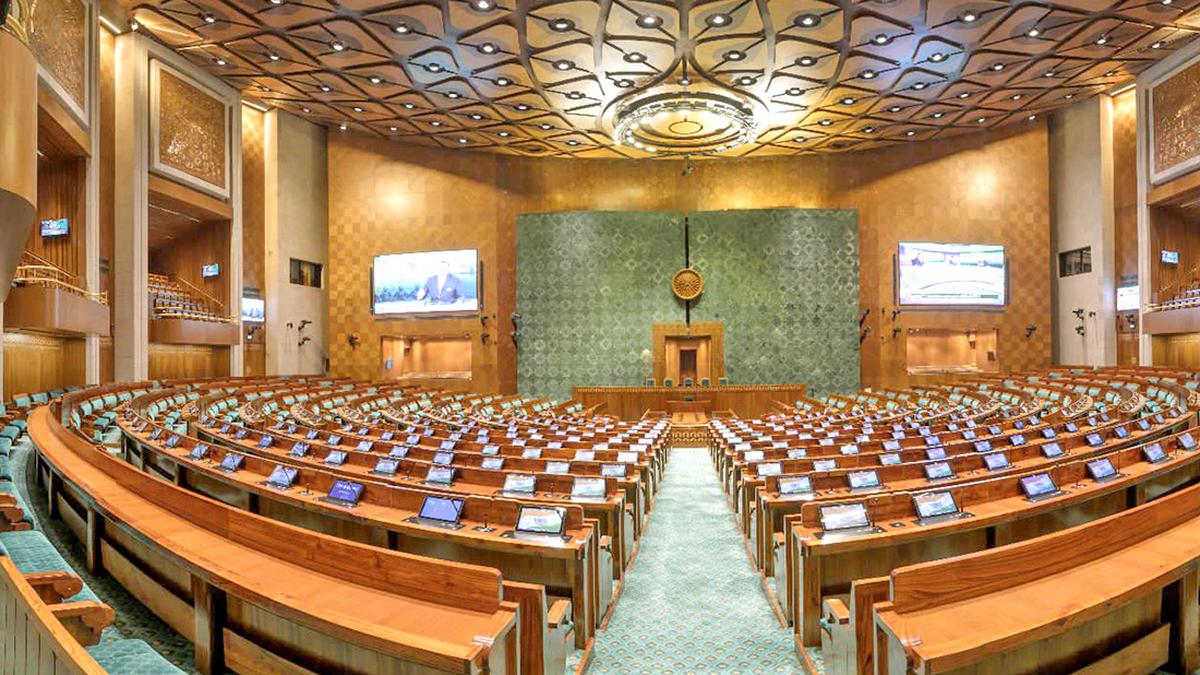
Opposition MPs, parliamentary disruptions Premium
The Hindu
Committed Members of Parliament emphasise the crucial role of the Opposition in shaping India’s legislative discourse
In the winter session of Parliament in 2023, the last for the year, the political scenario in India underwent a change that caused much concern when a substantial number of Members of Parliament from the Opposition were suspended. A total of 141 lawmakers were suspended for ‘causing disruptions’ during the House proceedings while pushing for a discussion on a security breach that had occurred in Parliament on December 13 — there were intruders who used gas canisters. The number of MPs suspended were 95 from the Lok Sabha and 46 from the Rajya Sabha, representing about 35 crore people or roughly 25% of India’s population.
Protests are vital for democratic governance, but their suppression raises concerns about the Opposition’s role and stifles diverse perspectives. Former Prime Minister Atal Bihari Vajpayee laid emphasis on the Opposition’s collaborative role in governance, underscoring the need for healthy debates and dissent. Parliamentary discussions are crucial for informed decision-making and inclusive legislation, addressing all stakeholders’ concerns.
To understand the Opposition’s contributions, we analysed the record of some of the suspended MPs. Certain MPs, transcending party lines, have made noteworthy contributions to the nation’s legislative landscape with their active involvement, commitment to their constituency and proactive policy-shaping goals.
Shashi Tharoor, a three-time Lok Sabha MP (Congress) from Thiruvananthapuram, Kerala, has a 94% attendance record, that surpasses national and State averages (79% and 83%). He was an active participant in 99 debates, the national (45.1) and State (76.1) averages being 45.1 and 76.1, respectively. Mr. Tharoor introduced 13 Private Member’s Bills, covering crucial topics, which was again well above the average. Mr. Tharoor received the Sansad Ratna Award in 2020.
S. Jothimani, Lok Sabha member (Congress) from Tamil Nadu’s Karur constituency, has an attendance record of 74%, actively addressing topics such as employment schemes, amendments, Budget discussions, infrastructure development, and flood relief. The 190 questions she has raised concern various sectors, including renewable energy, agriculture, education, health care, and social justice. As a newcomer, Ms. Jothimani has introduced Private Member Bills on menstrual hygiene and paternity benefits.
Manoj Kumar Jha, Rajya Sabha MP (Rashtriya Janata Dal) from Bihar has a 97% participation rate. He has raised 347 questions and six Private Member’s Bills, which include legislative reforms such as the Prevention of Torture Bill, 2022, and 0the Right to Health Bill, 2021. With accolades such as the Lokmat and Sansad Ratna Parliamentary Awards, Mr. Jha’s parliamentary journey began with his recognition as best debutant parliamentarian.
The attendance record of Supriya Sule, the Nationalist Congress Party’s three-time MP from Maharashtra’s Baramati constituency is 93%,. Ms. Sule has been active in 238 debates, raising 609 questions, and introducing 16 Private Member’s Bills, including The Census (Amendment) Bill, 2022, and The Protection of Rights of Widows and Single Women Bill, 2022. She won the 2021 Sansad Ratna Award.











